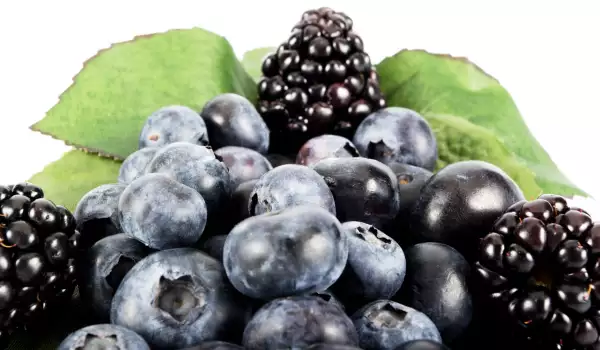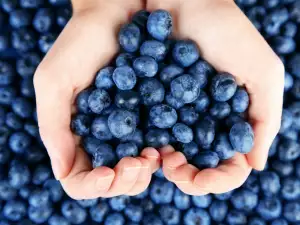Blueberries are fruits that grow on a bush belonging to the Piraeus family, whose members include cranberry, azalea, mountain laurel and rhododendron. Blueberries grow in clusters and in size can range from that of a small pea to that of a marble. They are rich in colors ranging from dark blue to purple-brown and black and have a white-gray waxy coating that serves as a protective coating. Their inner part is semi-transparent, and the seeds are small. Cultivated blueberries are usually slightly sweet, while the wild ones have a sour and tangy flavor.
Blueberries come from North America, where they grow in forest and mountain regions of the United States and Canada. This fruit rarely grows in Europe and was recently introduced in Australia. Blueberries were not cultivated until the early 20th century, and appeared commercially in 1916
Composition of blueberries
Blueberries are very good sources of carotene, Vitamin B1, Vitamin B2, Potassium, Sodium, Calcium, Magnesium, Phosphorus, Iron. Blueberries contain significant amounts of anthocyanidines, antioxidant compounds that give blue, purple and red colors to fruits and vegetables. These berries contain ellagic acid, another phytochemical that prevents the destruction of cells. Blueberries are also a good source of vitamin C, manganese and soluble and insoluble fiber like pectin. They are a good source of vitamin D. 145 g blueberries contains 81.2 calories and 0.98 g protein.
The berry also contains sugars, organic acids (malic, citric, succinic, etc..), Tannins, glycosides, pectin and coloring matter.
Types of berries
There are about 30 different kinds of berries grown in different regions.
Blue berry - comes from North America, found in many mountains. Blooms in May-June and ripens in July-September. Its fruits are with a greenish flesh, dove blue coating, and underneath are dark blue. Even after full maturing the fruit continues to develop. It is rich in many minerals and tannins, vitamins A and C, iron, manganese and sugar.

Cranberry - a fruit that grows on evergreen subshrubs. The fruits are ripe and juicy red. Cranberry is rich in vitamins, minerals and many nutrients.
Black Berry - characterized by dark blue color, sour taste and meaty texture. It is distributed in high mountains and is rich in many vitamins and tannins.
Caucasian blueberry - Like its siblings, it is very delicious and has many health benefits.
Culinary uses of blueberries
Blueberries are delicious, so they are widely used in cooking. They can be eaten both alone and in many pies, muffins and cakes. Also serve as a great decoration and combines well with other fruits. The berry can be sweet and juicy, which are also very tasty and nutritious.
Selecting and storing blueberries
When choosing blueberries, select those that are firm and have a lively color with a whitish hue. You should avoid fruits that are more opaque in color or are soft and pale. Best antioxidant fully ripe berries.
Ripe berries should be stored in a container in the refrigerator where they can be stored for about a week, though it is best to consume them within a few days. Before storing, check the fruit and remove any damaged berries to prevent the spread of mold. Before storing blueberries, do not wash them, as this will remove the protective coating that protects the skin from degradation.

Benefits of blueberries
Blueberries are the fruits with the highest ability to break down free radicals. They contain anthocyanidins that counteract the harmful effects of free radicals on collagen matrix of cells and tissues that can lead to cataracts, glaucoma, varicose veins, hemorrhoids, peptic ulcers, heart disease and cancer. Anthocyanins help to improve the integrity of the support structures in the veins throughout the vascular system. Consumption of these small berries ensures natural protection against high blood pressure.
Blueberries have cardio- defensive functions. Numerous studies have shown that they can improve visual acuity and night vision. They help to reduce the risk of age-related macular degeneration.
Blueberries also help protect the brain from oxidative stress and reduce the risk of diseases such as Alzheimer's and dementia. Snacking on blueberries is recommended for kidney stones, rheumatism, anemia and skin diseases.
Blueberries contain another antioxidant compound that blocks metabolic pathways that can lead to cancer. Thanks to it, they provide protection against colon cancer, ovarian cancer and others.
High levels of manganese and iron in blueberries have favorable effect on hematopoiesis and fresh blueberries and blueberry juice have anti-inflammatory actions.
For the elderly, blackberries are extremely helpful and regular consumption is recommended. They not only improve vision, help brain function, but also reduce the risk of Alzheimer's.
Healthy syrup from blueberries
Choose healthy and ripe black berries that are crushed and allowed to stand for two hours, then made into mush, and the juice is strained through a gauze or cheesecloth. For every liter of juice add 2 kg sugar and 5 grams citric or tartaric acid. Cranberry juice is poured into dark and dry bottles and stored in a cool, dry place.
Weight Loss with blueberries
This diet lasts three days, during which you can safely drop three kilograms. To do this, you need fresh or frozen blueberries, fresh yogurt, cottage cheese, low-fat, non-fat yogurt, low-fat and cream.
Each of the three days, observe the same menu. Breakfast is 100 g cottage cheese, mixed with half a cup of blueberries and a teaspoon of cream. Lunch consists of 100 grams of cottage cheese mixed with half a cup of blueberries and a cup of yogurt or milk. For a snack, you can make a cocktail of 100 ml yogurt and half a cup of blueberries.
Dinner is a cocktail of 125 ml. yogurt or milk and half a cup of blueberries. Make a bedtime cocktail of a cup of yogurt and half a cup of blueberries.
With this diet you will lose not just a few extra pounds, but it will happen beautify. This diet is not recommended for people with digestive problems.
Dangers of Blueberries
Blueberries are one of the few foods that contain measurable amounts oxalates. When they become too concentrated in body fluids, they can crystallize and cause health problems. For this reason, people with kidney or gallbladder issues should avoid eating blueberries.



















Comments